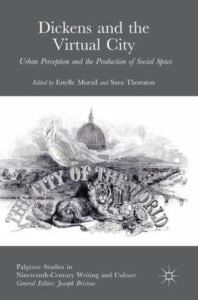
Dickens and the Virtual City
Urban Perception and the Production of Social Space
Publication | Table des matières | Critiques
Résumé
This book explores the aesthetic practices used by Dickens to make the space which we have come to know as the Dickensian City. It concentrates on three very precise techniques for the production of social space (counter-mapping, overlaying and troping). The chapters show the scapes and writings which influenced him and the way he transformed them, packaged them and passed them on for future use. The city is shown to be an imagined or virtual world but with a serious aim for a serious game: Dickens sets up a workshop for the simulation of real societies and cities. This urban building with is transferable to other literatures and medial forms. The book offers vital understanding of how writing and image work in particular ways to recreate and re-enchant society and the built environment. It will be of interest to scholars of literature, media, film, urban studies, politics and economics.
Table des matières
Part I Introduction
1 Dickensian Counter-Mapping, Overlaying, and Troping: Producing the Virtual City
Estelle Murail and Sara Thornton
Part II Counter-Mapping: The New Information Maps of Dickens
2 The Railway and the River: Conduits of Dickens’ Imaginary City
Ben Moore
3 Re-envisioning Dickens’ City: London Through the Eyes of the Flâneur and Asmodeus
Estelle Murail
4 The Bleeding Heart of Criminal Geography in Dickens’ London
Cécile Bertrand
5 One Hundred and Five, North Tower’: The City as a Prison-Home Narrative in Charles Dickens’ A Tale of Two Cities (1859)
Divya Athmanathan
Part III Overlaying and Ghosting: London as America, Africa, Arctic, India
6 The ‘Something’ that His Brain Required: America’s Role in the Development of Dickens’ Urban Imagination
Nancy Aycock Metz
7 Dickens and His Urban Museum: The City as Ethnological Spectacle
Fanny Robles
8 ‘Reddening the Snowy Streets:’ Manchester London, Paris or a Tale of Three Cities
Catherine Lanone
9 ‘Our Mutual City:’ The Posterity of the Dickensian Urbanscape
Georges Letissier
Part IV Troping: Sensing the City and the Acts of Reading and Writing
10 The Role of Hypallage in Dickens’ Poetics of the City: The Unheimlich Voices of Martin Chuzzlewit
Françoise Dupeyron-Lafay
11 No Thoroughfares in Dickens: Impediment, Persistence, and the City
Jeremy Tambling
12 A Production of Two Cities and of Four Illustrators
Philip V. Allingham
Bibliography
Index
Critiques
- “This important volume from an authoritative international team of authors sheds significant new light on the comparative development of post-war Conservatism in the western world.”
– Stuart Ball, Professor Emeritus, University of Leicester, UK - “The rich essays collected in this illuminating volume show that the rise of right-wing politics in the United Kingdom, the United States, and France since the 1970s was a remarkably transnational phenomenon. As they attacked social democracy and cultural pluralism, right-wing movements borrowed ideas, visions, vocabularies, and tactics from each other, adapting them to their own national idioms and using advances in one country to win advances elsewhere. Anyone interested in confronting the problems that have proliferated in the wake the right’s reconfiguration of politics – surging inequality, belligerent ethno-nationalism, worker disempowerment and insecurity, and lost faith in the capacity for democratic self-government – has much to learn about the origins of these problems from this important book.”
– Joseph A. McCartin, Georgetown University, USA, author of Collision Course
